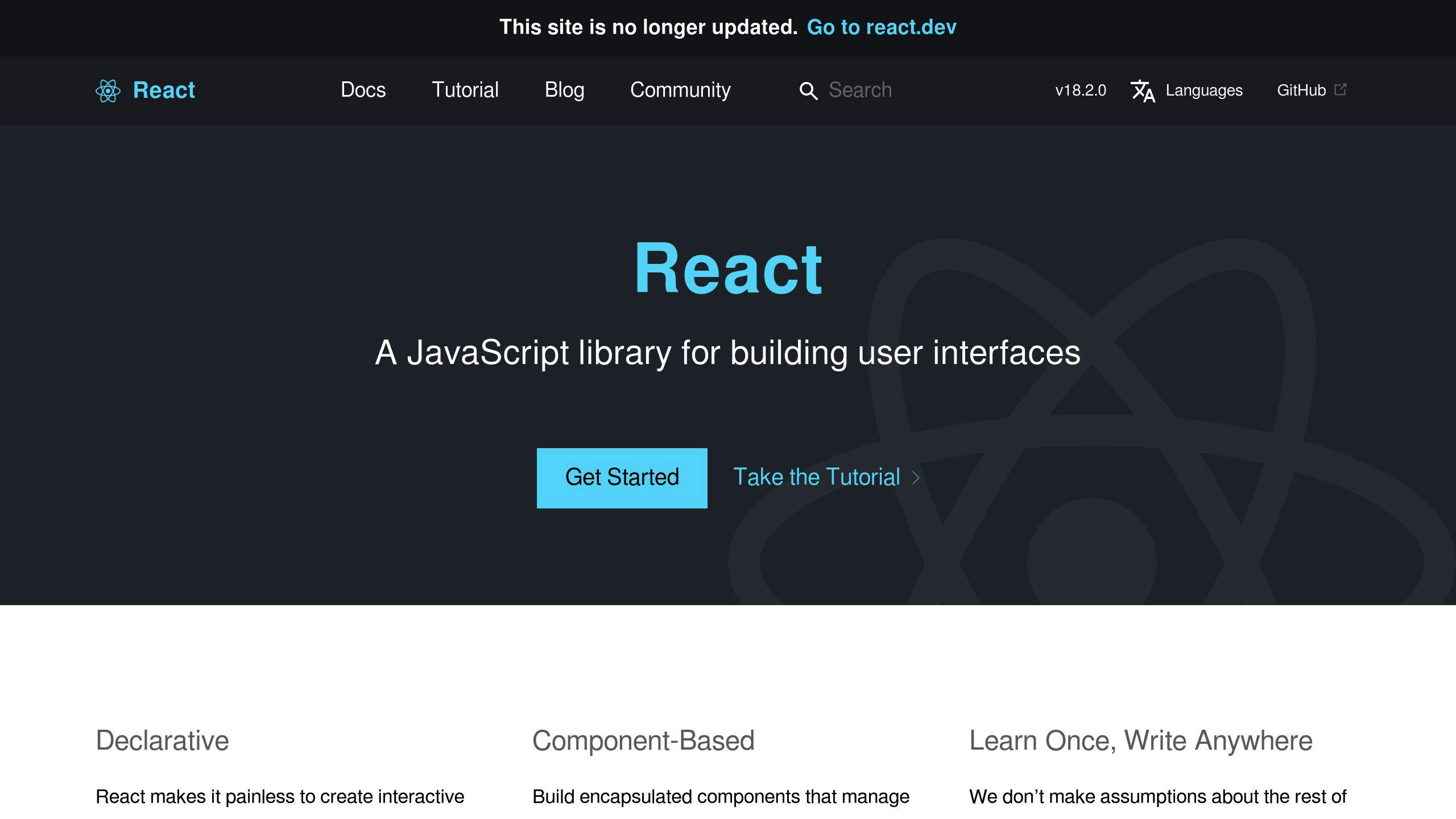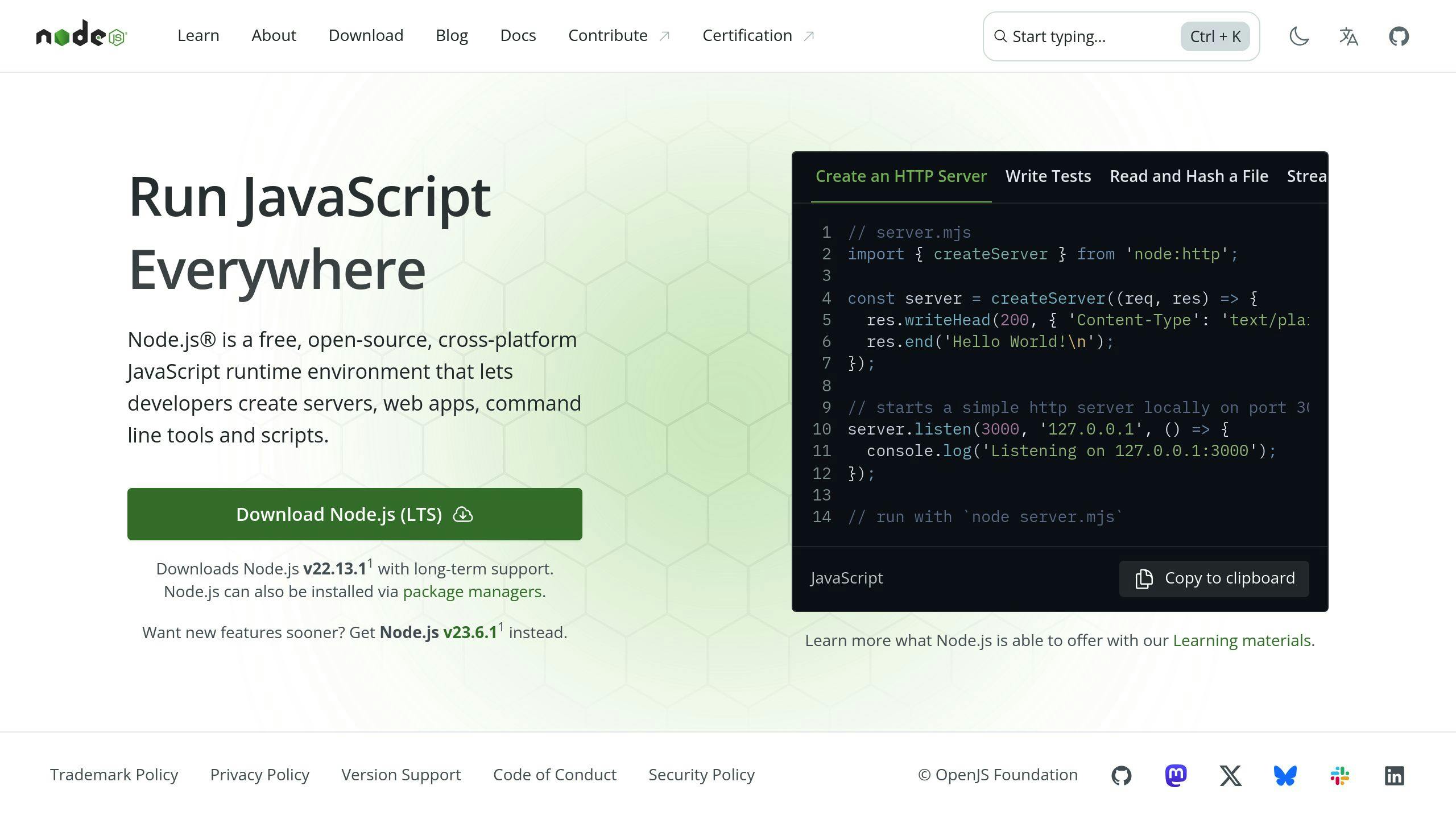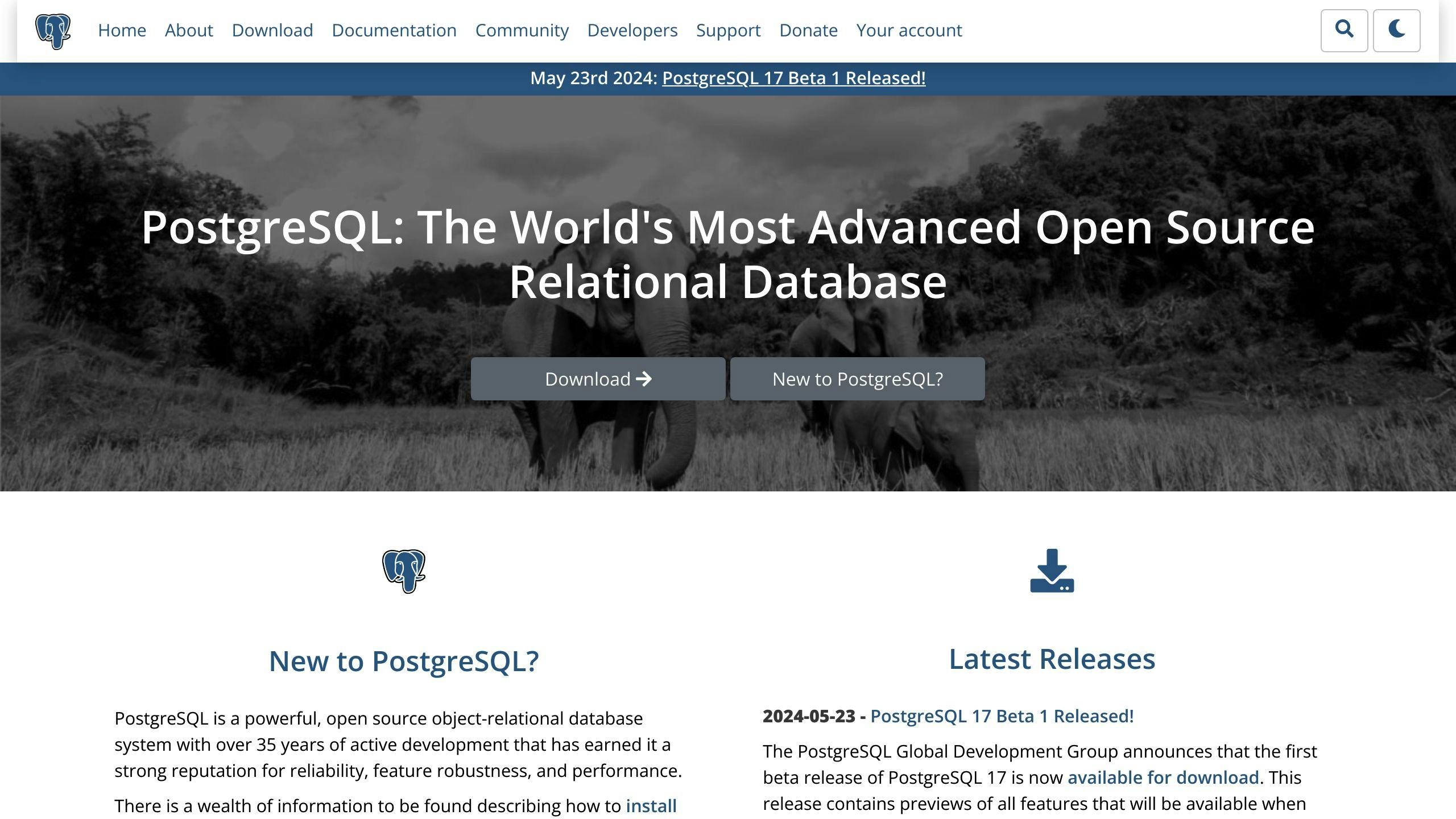10 Tools Indie Hackers Use to Build Products
Here's a quick overview of 10 essential tools for indie hackers:
| Tool | Purpose | Key Features |
|---|---|---|
| React | UI development | Component-based, Virtual DOM, Hooks |
| Node.js + Express | Backend development | Fast, Scalable, Large community |
| PostgreSQL | Database management | ACID compliant, Scalable, Data integrity |
| GitHub | Version control | Collaboration, Issue tracking, Code review |
| Figma | Design | Real-time collaboration, Vector tools, Plugins |
| Trello | Project management | Boards, Cards, Lists, Checklists |
| Google Analytics | Web analytics | Auto insights, Custom reports, Event tracking |
| Intercom | Customer communication | In-app messaging, Help center, Ticket assignment |
| Stripe | Payment processing | Online payments, Invoicing, Subscriptions |
| Vercel | Deployment | Auto builds, Preview deployments, Global CDN |
These tools cover coding, design, data tracking, and payments, helping indie hackers build and launch products efficiently. Each tool has its strengths, so choose based on your project needs and workflow preferences.
Related video from YouTube
1. React

React is a JavaScript library for building user interfaces. It's widely used by indie hackers to create web applications.
Key Features
React offers several features that make it useful for building web apps:
| Feature | Description |
|---|---|
| Component-based | Build UIs with reusable pieces |
| Virtual DOM | Improves app speed |
| Hooks | Manage state and side effects easily |
| TypeScript support | Add optional static typing |
Benefits
React can help indie hackers in many ways:
-
Easy to create complex UIs
-
Fast and responsive apps
-
Large community for support
-
Many ready-to-use libraries
Things to Keep in Mind
When using React, indie hackers should:
-
Be ready to learn new concepts
-
Choose the right tools to use with React
-
Plan their app structure carefully
React is a good choice for indie hackers who want to build fast, easy-to-maintain web apps. Its large community and many features make it a popular tool for creating user interfaces.
2. Node.js + Express

Node.js + Express is a popular combo for building web apps. Node.js lets you use JavaScript on servers, while Express is a simple framework for making web apps.
Key Features
Here's what Node.js + Express offers:
| Feature | Description |
|---|---|
| Quick | Node.js runs JavaScript fast, and Express is light |
| Easy to change | Express lets you add different parts as needed |
| Big community | Lots of people use it, so help is easy to find |
Benefits
Using Node.js + Express can help indie hackers:
-
Build web apps quickly
-
Handle lots of users and data
-
Work well with other tools
-
Get help from many other users
Things to Think About
When using Node.js + Express, keep in mind:
-
You need to know JavaScript well
-
You might need to add extra tools for some features
-
It can take time to learn all its parts
Node.js + Express is good for making fast web apps that can grow. It's a solid choice if you're comfortable with JavaScript and want to build your product quickly.
3. PostgreSQL

PostgreSQL is a free, open-source database system that many indie hackers use. It's known for being reliable and handling large amounts of data well.
Key Features
Here's what PostgreSQL offers:
| Feature | What it does |
|---|---|
| ACID Compliance | Makes sure database actions are done safely |
| Handles Growth | Works with lots of data and busy apps |
| Keeps Data Safe | Uses special data types and checks to keep data correct |
| Can Be Changed | Lets you add your own functions and data types |
| Protects Data | Has strong safety features, including encryption |
Good Things
Using PostgreSQL can help indie hackers:
-
Build apps that can grow
-
Keep data correct and safe
-
Use special data types and functions
-
Make apps more secure
-
Get help from many other users
Things to Think About
When using PostgreSQL, remember:
-
It can be harder to learn than other databases
-
You need to set it up carefully to work well
-
You might need extra tools for some tasks
PostgreSQL is a strong database system that can help indie hackers build good apps. It has many useful features and a big group of users who can help.
4. GitHub

GitHub is a website where people can work on code together. It's useful for indie hackers building products.
Key Features
| Feature | What it does |
|---|---|
| Version Control | Keeps track of code changes |
| Open-source | Lets people share and work on projects |
| Teamwork | Helps many people work on one project |
| Issue Tracking | Helps find and fix problems |
| Code Review | Lets people check each other's work |
Good Things
Using GitHub can help indie hackers:
-
Work with others on projects
-
Keep track of code changes
-
Share projects and get help
-
Make code better by having others look at it
-
Keep track of problems and fix them
Things to Think About
When using GitHub, remember:
-
It takes time to learn how to use it well
-
You need to set up your projects carefully
-
You might need to deal with disagreements when working with others
GitHub is a good tool for indie hackers. It helps with working together, keeping track of code, and fixing problems. Many people use it to build and take care of their products.
5. Figma

Figma is a design tool that works in your web browser. It helps indie hackers make designs for their products.
Key Features
| Feature | Description |
|---|---|
| Team Design | Many people can work on the same design at once |
| Vector Tools | Easy to make and change shapes |
| Plugins | Add extra tools to help with design |
| Web-based | Works on any computer with a web browser |
Benefits
Figma helps indie hackers:
-
Work with others on designs
-
Make designs that look good on different screen sizes
-
Share designs with developers easily
-
Use it on any computer
-
Add extra tools with plugins
Things to Think About
When using Figma:
-
It takes time to learn how to use it well
-
The free plan only lets you make a few designs
-
It's important to plan your designs carefully
Figma is a good tool for indie hackers who want to make designs for their products. It's easy to use and lets people work together on designs.
sbb-itb-d6c26b0
6. Trello

Trello is a tool that helps indie hackers manage their projects. It uses boards to show work, making it easy to see progress and work with others.
Key Features
| Feature | What it does |
|---|---|
| Boards | Show work and track progress |
| Cards | Stand for tasks or projects |
| Lists | Group cards into steps or types |
| Checklists | Break tasks into smaller parts |
| Due Dates | Set when tasks need to be done |
| Team Work | Let others join boards and do tasks |
Good Things
Trello helps indie hackers:
-
Keep tasks in order
-
See how work is going
-
Work with team members
-
Split big projects into small tasks
-
Set times for when work needs to be done
Things to Think About
When using Trello:
-
It takes time to set up boards and lists
-
The free plan has fewer features
-
You need to plan how you'll use it
Trello is good for indie hackers who need to handle many projects and tasks. It's easy to see and use, making it great for teams and solo workers.
7. Google Analytics

Google Analytics helps indie hackers see how people use their websites. It shows you who visits, what they do, and how they act on your site.
Key Features
| Feature | What it does |
|---|---|
| Auto Insights | Finds patterns in your data |
| Custom Reports | Lets you make your own charts and graphs |
| Ad Reports | Shows how well your ads work |
| Events | Tracks everything users do on your site |
Good Things
Google Analytics helps indie hackers:
-
Know who their users are
-
Find parts of their website to fix
-
See if their ads are working
-
Make choices based on facts
-
Make their website better for users
Things to Think About
When using Google Analytics:
-
Set it up right to get good data
-
Learn how to use the new GA4 version
-
Be careful with user data and follow the rules
-
Use what you learn to make your product better
Google Analytics is a good tool for indie hackers who want to know more about their users and make their websites better.
8. Intercom

Intercom is a tool that helps indie hackers talk to their customers. It lets them send messages, set up automatic tasks, and help customers when they need it.
Key Features
| Feature | What it does |
|---|---|
| Acquire | Lets you talk to people who visit your website |
| Resolve | Gives help to customers right in your app |
| Assign tickets | Lets you give customer questions to different team members |
| Internal notes | Lets team members leave notes for each other |
Good Things
Using Intercom can help indie hackers:
-
Talk to customers in a more personal way
-
Make helping customers easier
-
Work better as a team
Things to Think About
When using Intercom, keep in mind:
-
It can be expensive, especially for small teams
-
You need to set it up carefully to use all its features
-
You need to be careful with customer information
Intercom is a good tool that can help indie hackers talk to customers better, help them faster, and work together more easily.
9. Stripe

Stripe is a tool that helps indie hackers handle online payments. It lets you take payments, send bills, and manage subscriptions.
Key Features
| Feature | What it does |
|---|---|
| Payment Processing | Take online payments from customers |
| Invoicing | Send bills to customers |
| Subscriptions | Handle regular payments for ongoing services |
| Entitlements | Control when customers can use certain features |
| Trials | Let customers try your service for free |
| Discounts | Lower prices for your products |
Good Things
Using Stripe can help indie hackers:
-
Make it easy for customers to pay
-
Get regular income from subscriptions
-
Save time with automatic billing
-
Work with different money types from around the world
Things to Think About
When using Stripe, remember:
-
You might need tech skills to set it up
-
You have to pay fees for using it
-
You need to follow rules about handling money
Stripe is a useful tool that can help indie hackers handle payments better, make customers happy, and grow their businesses.
10. Vercel

Vercel is a tool that helps indie hackers put their web apps online. It makes it easy to get your app up and running without much fuss.
Key Features
| Feature | What it does |
|---|---|
| Auto Builds | Builds your app for you |
| Always Up-to-Date | Puts new changes online right away |
| Preview Sites | Shows you how your site looks before it goes live |
| Easy Fixes | Lets you go back to old versions if something breaks |
| Updates | Tells you when your app is online or if there's a problem |
| Fast Loading | Uses servers around the world to make your app load quickly |
Good Things
Using Vercel can help indie hackers:
-
Spend more time coding and less time setting things up
-
Keep their app fresh without extra work
-
Fix problems quickly by going back to old versions
-
Know what's happening with their app
-
Make sure people can use their app quickly no matter where they are
Things to Think About
When using Vercel, keep in mind:
-
You might need to know a bit about coding to set it up
-
You can use it for free, but you can pay for more features
-
It doesn't work with every tool out there
Vercel is a good choice for indie hackers who want to put their web apps online without a lot of extra work.
Wrap-up
We've looked at 10 tools that can help indie hackers build good products. Each tool has its own uses and good points. Here's a quick summary:
| Tool | Main Use |
|---|---|
| React | Making web app interfaces |
| Node.js + Express | Building web apps |
| PostgreSQL | Storing data |
| GitHub | Working on code together |
| Figma | Designing products |
| Trello | Managing projects |
| Google Analytics | Understanding website use |
| Intercom | Talking to customers |
| Stripe | Handling payments |
| Vercel | Putting web apps online |
To build a good product:
-
Try different tools to find what works for you
-
Pick tools that fit how you work
-
Use tools that help you focus on making your product better
Remember:
-
Building a product takes time and hard work
-
The right tools can make your job easier
-
Keep working on your product and don't give up